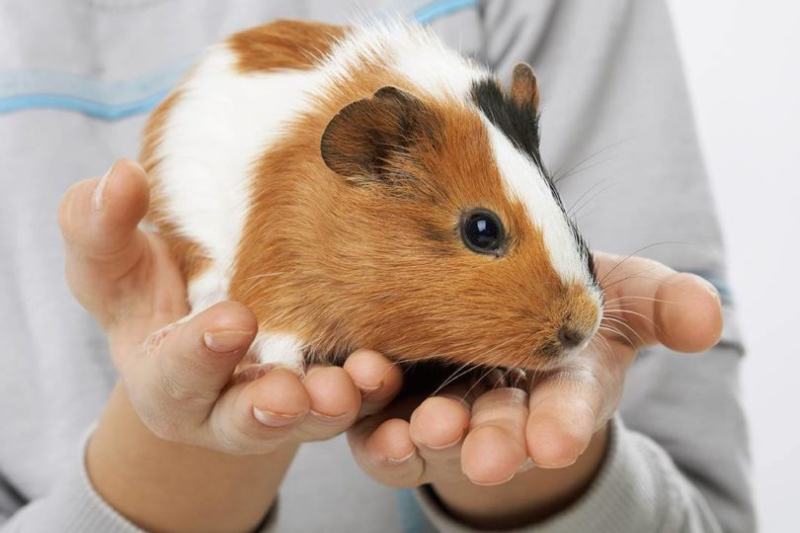Guinea pigs, also called cavies, are cherished pets known for their sweet temperament and adorable appearance. While their cuteness is undeniable, these small animals also have a unique way of communicating with their owners through vocalizations.
One such sound that may puzzle pet owners is the purring noise. Unlike the long, soothing purr of a cat, the guinea pig’s purr is a softer, low-pitched rumble, which may seem unusual for such a small rodent. In this article, we’ll explore the science behind guinea pig purring, the various reasons they purr, and how to interpret it.
READ MORE:
Guinea Pig Care: From Nibbling to Napping
A Complete Guide to Feeding Your Guinea Pig: From Hay to Treats
Funny Guinea Pig Names
Choosing the Perfect Name for Your Guinea Pig
Contents
- 1 Understanding the Different Sounds of a Purring Guinea Pig
- 2 Why Does My Guinea Pig Purr? Common Reasons for Purring
- 3 Is My Guinea Pig Purring Happily? Understanding the Emotions Behind Purring
- 4 When to Worry: Differentiating Purring from Other Sounds
- 5 Strengthening Your Bond: Responding to Your Guinea Pig’s Purring
- 6 Conclusion
Understanding the Different Sounds of a Purring Guinea Pig

As we explore guinea pig purring, it’s important to note that it differs from cat purring. While both involve throat vibrations, guinea pigs use a different mechanism to produce their purr. This results in a softer, more subtle sound compared to the typical cat purr. Additionally, guinea pigs’ purring can have a variety of meanings. Let’s break down some common guinea pig sounds:
Wheeking
One of the most common sounds is the high-pitched squeal known as “wheeking.” This sound is typically heard when guinea pigs are excited, hungry, or seeking attention. It’s often a way for them to let you know they want food or interaction. However, wheeking can sometimes indicate discomfort or distress, so it’s important to pay attention to their body language as well.
Chirping
Chirping, which is less common than wheeking, resembles a bird’s call. Guinea pigs may chirp when they’re excited, curious, or anxious. The sound is often accompanied by jumping or running around. Some guinea pigs may also chirp when they are being petted or interacting with their environment, showing contentment.
Brrr-ing
A low-pitched rumbling, or “brrr,” is often confused with purring. This sound is usually a sign of unease, often indicating that the guinea pig feels threatened or uncomfortable. You may hear this sound when guinea pigs meet for the first time or when they encounter a new object in their environment. It’s a warning sound, often suggesting the need for more space or a retreat.
Purring
Purring, the primary focus of this article, is a gentle, low-pitched rumble that guinea pigs make when they feel relaxed and content. Unlike cats, who purr for long periods, guinea pigs’ purrs are more intermittent, lasting just a few seconds. The tone and intensity of the purr can vary depending on the circumstances and the guinea pig’s emotional state.
Why Does My Guinea Pig Purr? Common Reasons for Purring
Now that we’ve explored the different sounds guinea pigs make, let’s discuss why they purr. Purring can indicate several things, and understanding these reasons can help you better interpret your guinea pig’s needs and emotions. Below are the most common reasons guinea pigs purr:
Contentment and Relaxation
The most frequent cause of purring is contentment. Guinea pigs will purr when they are being cuddled, fed, or when they feel safe and comfortable in their environment. This purring often happens when they’re relaxing or napping, signifying that they are happy and at ease.
Seeking Attention
Guinea pigs can also purr when they want attention. If your guinea pig purrs when you enter the room or when they aren’t getting enough interaction, it might be their way of asking for affection or playtime. This behavior shows that they have bonded with you and are seeking companionship.
Bonding Between Guinea Pigs
Guinea pigs are social animals and often purr to communicate with each other. When they are together, purring can be a sign of bonding, especially during grooming sessions or while cuddling. If you have more than one guinea pig, you may notice this behavior as they form stronger social connections.
Seeking Comfort
Sometimes, guinea pigs purr when they feel anxious or frightened, seeking comfort and reassurance. If your guinea pig is purring but also showing signs of fear, such as hiding or trembling, it’s important to ensure they feel safe and secure in their environment.
Pain and Discomfort
Although it is less common, guinea pigs may purr when they are in pain or discomfort. This can be tricky to differentiate from purring due to contentment, as the sounds are similar. However, if your guinea pig is purring while also displaying signs like lethargy, loss of appetite, or a strange posture, it’s a good idea to consult with a veterinarian to rule out any health issues.
Is My Guinea Pig Purring Happily? Understanding the Emotions Behind Purring
While guinea pigs often purr when they are happy and relaxed, purring can also indicate other emotions. It’s important to consider the context of the purring and other behaviors that accompany it. Here’s what their purring might mean:
Happiness and Contentment
When a guinea pig purrs out of happiness, it is typically accompanied by a relaxed body and calm demeanor. They may close their eyes, sit still, or even nap while purring, all signs of contentment and well-being.
Seeking Attention
If your guinea pig is purring while seeking attention, they may not be entirely happy. They might feel a bit neglected and are trying to get your focus. In this case, offering more affection or interaction will help address their needs and improve their mood.
Anxiety and Fear
Some guinea pigs may purr when anxious or scared, especially in response to environmental changes or new experiences. In these instances, the purring is a way to self-soothe and ask for reassurance from their human companion.
Pain or Discomfort
In some cases, guinea pigs may purr even when they are in pain or discomfort. This can be misleading because purring is usually a sign of contentment. If you notice unusual behaviors such as reluctance to move or changes in eating habits along with purring, it’s crucial to have them checked by a veterinarian.
When to Worry: Differentiating Purring from Other Sounds
Not all guinea pig vocalizations are purring, and it’s important to distinguish between purring and other sounds that could indicate distress. Here are a few tips for differentiating guinea pig purring from other common sounds:
- Brrring: Often linked to fear or discomfort, brrring is a more intense sound compared to purring. It’s typically accompanied by physical tension, such as the guinea pig backing away or becoming alert.
- Chirping: Chirping is a higher-pitched sound than purring and is often associated with excitement or anxiety. If your guinea pig is chirping while moving around or jumping, they are likely expressing curiosity or a mild level of excitement.
Observing your guinea pig’s body language along with their sounds will help you better interpret their emotional state. If you’re ever unsure, consulting with a vet can help clarify what your guinea pig might be experiencing.
Strengthening Your Bond: Responding to Your Guinea Pig’s Purring

Understanding your guinea pig’s vocalizations is key to maintaining a healthy, positive relationship. Here are some ways to respond to your guinea pig’s purring:
- Cuddles and Playtime: If your guinea pig is purring because they are content or seeking attention, giving them some quality time with cuddles or play can help strengthen your bond.
- Provide Comfort: If the purring is accompanied by signs of fear or anxiety, try to create a calm, secure environment for your guinea pig. Remove potential stressors or simply sit near them to offer comfort.
- Consult a Veterinarian: If you suspect your guinea pig is purring due to illness or discomfort, seek professional help to address any health concerns promptly.
Conclusion
Guinea pig purring is a fascinating behavior that can indicate various emotions, from happiness and relaxation to anxiety or discomfort. By learning to interpret the purring sounds and understanding the context in which they occur, you can respond appropriately to your guinea pig’s needs. Whether it’s a sign of contentment or a cry for help, paying attention to these vocalizations and providing the right care can enhance your relationship with your guinea pig and ensure their happiness and well-being.
